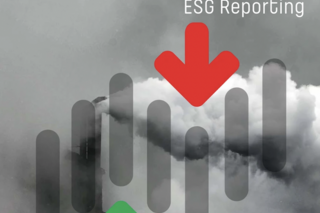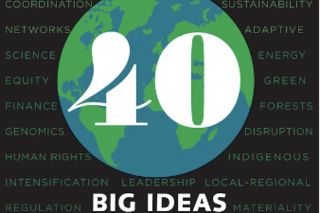-
The Labyrinth of Sustainability: Green Business Lessons from Latin American Corporate Leaders
Edited by Daniel C. Esty

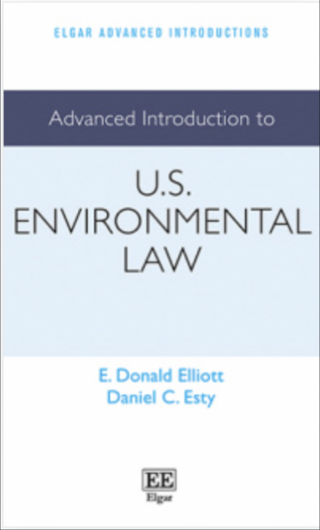
Advanced Introduction to Environmental Law
December 1, 2021
By Daniel C. Esty and E. Donald Elliott
Providing a comprehensive overview of the current and developing state of environmental governance in the United States, this Advanced Introduction lays out the foundations of US environmental law.
E. Donald Elliott and Daniel C. Esty explore how federal environmental law is made and how it interacts with state law, highlighting the important role that administrative agencies play in the creation, implementation, and enforcement of U.S. environmental law.
Key features include:
• an examination of the key statutes, case law, and controversies involved in the regulation of natural resources
• a survey of the broad range of regulations and legal principles that govern the protection of the environment in the United States
• analysis of relevant statutes for specific issues including air and water pollution, climate change, endangered species, wilderness preservation, hazardous waste, and pesticides.
This Advanced Introduction will be a valuable resource for scholars and students of environmental law. It will also be beneficial for environmental lawyers, business executives, NGO leaders, policymakers, and think tank analysts who work on environmental issues
‘In the world of environmental law and policy, Yale Professors Dan Esty and Don Elliott shine brightly as stars in a galaxy of academic excellence. Their new book is current, readable, and provides the critical principles that are the platform for the building blocks of environmental progress.’
John C. Cruden, former Assistant Attorney General, Environment and Natural Resources Division, US Department of Justice
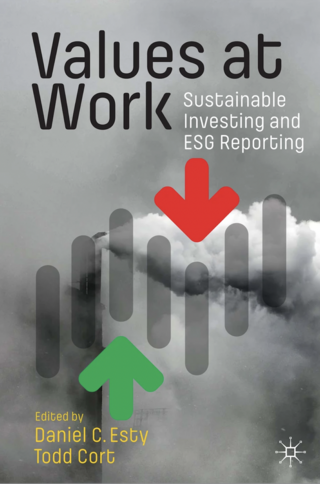
Values at Work: Sustainable Investing and ESG Reporting
December 1, 2020
Edited by Daniel C. Esty and Todd Cort
Sustainable investing is a rapidly growing and evolving field. With investors expressing ever greater interest in environmental, social, and governance (ESG) metrics and reporting, companies face a sustainability imperative and the need to remake their business models to respond to an array of pressing issues including climate change, air and water pollution, racial justice, workplace diversity, economic inequality, privacy, corporate integrity, and good governance. From equities to fixed income and from private equity to impact-investing, investors of all kinds now want to understand which companies will be marketplace leaders in a business future redefined by sustainability. Thus, investment strategies, risk models, financial vehicles, applications, data, metrics, standards, and regulations are all changing rapidly around the world.
In an effort to better understand the current status and movement of this dynamic field and to provide a practical reference for the growing pool of investors, financial advisors, companies, and academics seeking information on sustainable investing and ESG reporting, this edited book covers the latest trends, tools, and thinking. It showcases the work of authors from leading companies and academic institutions across a range of vital topics such as financial disclosure, portfolio assessment, ESG metrics construction, and law as well as regulation. Readers of the book will be better able to identify and address the hurdles to moving mainstream capital toward more sustainable companies, investments, and projects.
- Provides a one-stop resource valuable to practitioners in an evolving field
- Explores critical new areas of consideration for practitioners such as legal implications, private equity, ESG risk and disclosure and portfolio-level assessment of ESG factors
- Showcases the most relevant areas of study and questions in ESG investing written accessibly
“Investors who want to make money, align with their values, or save the world—in other words, every investor—should read this book.”
Tatiana Schlossberg, Journalist and Author, Inconspicuous Consumption: The Environmental Impact You Don’t Know You Have
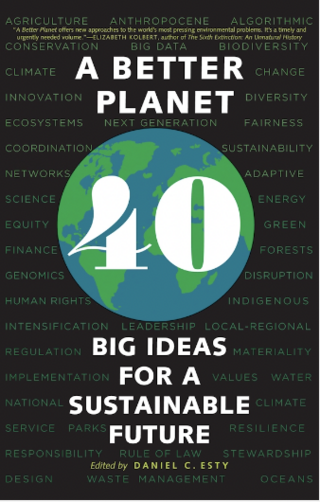
A Better Planet: 40 Big Ideas for A Sustainable Future
By Dan Esty, Published October 22nd, 2019
A practical, bipartisan call to action from the world’s leading thinkers on the environment and sustainability
Sustainability has emerged as a global priority over the past several years. The 2015 Paris Agreement on climate change and the adoption of the seventeen Sustainable Development Goals through the United Nations have highlighted the need to address critical challenges such as the buildup of greenhouse gases in the atmosphere, water shortages, and air pollution. But in the United States, partisan divides, regional disputes, and deep disagreements over core principles have made it nearly impossible to chart a course toward a sustainable future.
This timely new book, edited by celebrated scholar Daniel C. Esty, offers fresh thinking and forward-looking solutions from environmental thought leaders across the political spectrum. The book’s forty essays cover such subjects as ecology, environmental justice, Big Data, public health, and climate change, all with an emphasis on sustainability. The book focuses on moving toward sustainability through actionable, bipartisan approaches based on rigorous analytical research.
“No one can criticize Dan Esty and his talented colleagues for not thinking big: there are ideas in this book that will appeal to anyone—and maybe a couple that will raise your hackles. It’s the kind of spirited, discipline-crossing, deep-dive that will help reorient a sometimes-stale environmental debate!”
Bill McKibben
Sustainability represents the overarching challenge of our day, which must be met with a commitment to a spirit of progress across the global community. A Better Planet offers an array of ideas for helping to deliver the ecological transition that is now an imperative.
Emmanuel Macron, President of France
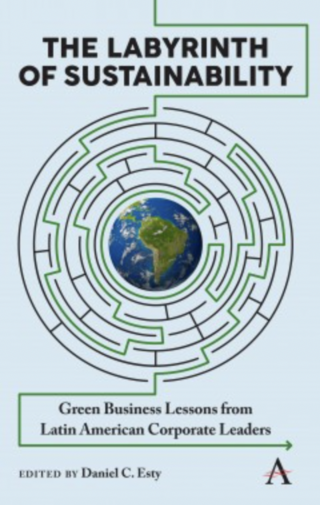
The Labyrinth of Sustainability
Green Business Lessons from Latin American Corporate Leaders
Edited by Daniel C. Esty
Companies can no longer afford to be ‘un’sustainable. While this observation has been widely accepted in the United States and Europe, only recently have Latin American companies and businesses across the developing world started to integrate sustainability principles into their corporate cultures. Recognizing and responding to this emerging trend, ‘The Labyrinth of Sustainability’ offers a collection of carefully developed and tightly framed case studies generated through the Latin American Corporate Sustainability Analysis project, an initiative convened by the Yale Center for Environmental Law and Policy in conjunction with the EGADE Business School in Mexico and INCAE Business school in Costa Rica and Nicaragua.
The introduction by Daniel Esty, the Hillhouse Professor of Environmental Law and Policy at Yale University and one of the world’s leading corporate sustainability experts, makes a compelling argument for what he calls the “sustainability imperative”—the notion that businesses must work toward sustainability to be successful in today’s marketplace. It distills from the 12 case studies that follow five important sustainability strategy lessons for executives and managers on leadership, vision and execution, partnerships, communications and inspiration.
The 12 case studies focus on the sustainability strategy and initiatives of a company with business operations in Latin America, drawing out key themes and highlighting both successes and challenges. The aim of ‘The Labyrinth of Sustainability’ is to present the problems and prospects for corporate sustainability in a Latin American context across a spectrum of companies that ranges from small businesses to multinational enterprises. With its Latin American focus and lessons for business in a range of industry settings, this volume complements previous analyses and case studies of corporate sustainability in different regional contexts.
The way that business approaches sustainability is changing rapidly as new opportunities and challenges emerge. The picture has become more complex––it’s no longer just about emissions, reputation or jobs. Rather, it’s about all these aspects at the same time. The Labyrinth of Sustainability examples show that smart companies have now integrated sustainability deeply into their decision-making process and are proving that
Peter Bakker, President and CEO, World Business Council for Sustainable Development
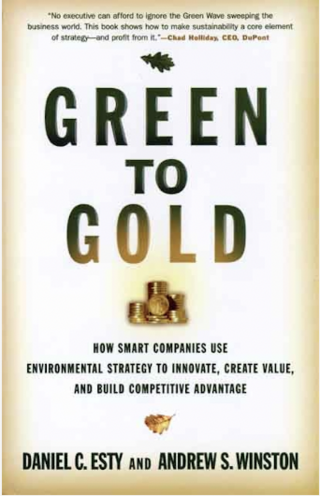
Green to Gold: How Smart Companies Use Environmental Strategy to Innovate, Create Value, and Build Competitive Advantage
by Daniel C. Esty and Andrew S. Winston
A must-read guide for business leaders who want to profit from the Green Revolution and avoid its many pitfalls
Winner of the 2007 National Best Books Award in the Business: Management and Leadership category
An (800) CEO-READ best-seller and top 25 business book for corporate America
This book explains what every executive should know to manage the environmental challenges facing society and the business world. Based on the authors’ rich experience with forward-thinking companies around the world, Green to Gold demonstrates how corporations create value by building environmental thinking into their overall business strategies. Daniel C. Esty and Andrew S. Winston provide clear how-to advice for making sense of environmental challenges, and they offer detailed case examples of how companies achieve both environmental and business success—establishing an eco-advantage in the marketplace.
Green to Gold is written for executives at all levels and businesses of all kinds. It guides the business leader through pollution and natural resource management issues and the growing pressure from outside stakeholders to strive for sustainability. While highlighting successful strategies, Esty and Winston also examine why environmental initiatives may fail despite best intentions.
With practical suggestions for incorporating environmental thinking into core business strategy, and with a clear focus on execution—not legalisms, platitudes, and abstractions—Esty and Winston present a thoughtful, pragmatic roadmap that shows how companies can use environmental pressures and responsibilities to spark innovation and drive growth.
With analytic rigor, corporate environmental advisors and Yale professors Esty and Winston probe the intersection of business concerns and environmental stewardship… . A nuanced picture of the challenge and complexity that adding an environmental dimension creates for businesses.
Kirkus Reviews

